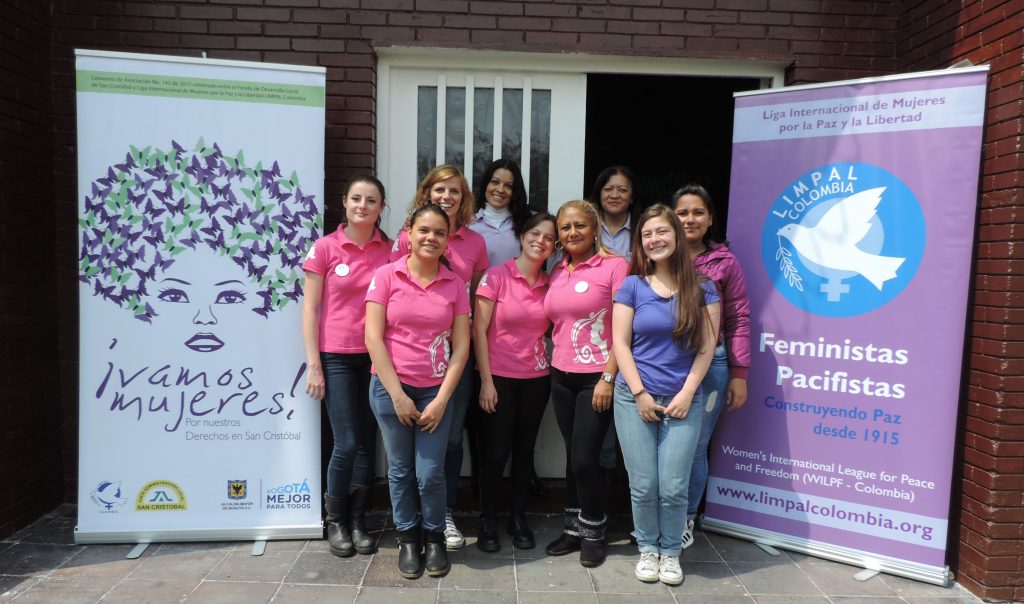Today Colombia’s government and the Revolutionary Armed Forces of Colombia (FARC) will sign a new peace agreement. The new agreement is a revised version of the peace agreement that was signed on 26 September, which was then rejected by a small margin on 2 October in a referendum by the Colombian people.
The ‘No’-vote leaders felt that there had been too many concessions to the FARC, with the perception that their crimes would go unpunished. The yes-no referendum campaign also became a political power play between two men: Juan Manuel Santos, the President of Colombia on the ‘Yes’ side, and the former president Álvaro Uribe on the ‘No’ side.
A new actor came to power in this game, one of the driving forces behind the ‘No’ side: the conservative religious and evangelical leaders. From the start they have been against the inclusive language on gender perspectives that the women’s movement and the LGBTI community, among others, have been working hard to make sure was included in the agreement. This was countered by a so-called “gender ideology” campaign, which took place in order to confuse people on what a gender perspective really is, and to influence them to vote No.
Since the ‘No side’ won the referendum, the FARC and the government have revised the peace agreement keeping the ‘No’ side’s demands in mind. On 22 November the two parties announced that, after being signed, the new peace agreement will be submitted to Congress for approval rather than put to another referendum.
The role of WILPF Colombia in the peace process
 WILPF Colombia (Liga Internacional de Mujeres por la Paz y la Libertad, LIMPAL) has supported the peace process from the start and has actively worked together with the women’s rights movement to ensure that women have been able to influence the process and to make sure that a gender perspective, including women’s rights, is included in the agreement itself, following UNSCR 1325. Katherine Ronderos, President of WILPF Colombia (LIMPAL), recently participated in a special delegation in Havana to meet with FARC representatives to provide analysis and recommendations on the importance of maintaining women’s rights and a gender perspective in the peace agreement.
WILPF Colombia (Liga Internacional de Mujeres por la Paz y la Libertad, LIMPAL) has supported the peace process from the start and has actively worked together with the women’s rights movement to ensure that women have been able to influence the process and to make sure that a gender perspective, including women’s rights, is included in the agreement itself, following UNSCR 1325. Katherine Ronderos, President of WILPF Colombia (LIMPAL), recently participated in a special delegation in Havana to meet with FARC representatives to provide analysis and recommendations on the importance of maintaining women’s rights and a gender perspective in the peace agreement.
Despite the changes that have been made in the revised text, WILPF Colombia (LIMPAL) and the women’s movement are supporting the new peace agreement. Katherine Ronderos explains that “women’s organisations and the LGBTI movement have not publicly shared any serious concerns about the changing of the language. It has been a difficult negotiation and we recognised that women’s rights and the gender perspective continue to be present in the new text of the agreement, which are already part of our constitution and legislation. Our country is not ready for a progressive agreement. It seems that we are in a conservative party living in the middle age. Of course some things have changed, in particular with the visibility of LGBTI community and their entitlement to have rights as victims of the conflict, but our main recommendations for women victims of the armed conflict are still reflected in the agreement.”
Katherine also points out that “the ones that are protesting right now are the leaders of the ‘No’ side, since they’re unhappy because their demands have not been fully incorporated in the new text. So they are the ones complaining about the new peace agreement, not us, the women’s movement.”
Everyone on the ‘Yes’ side is currently trying to make as little noise as possible about the new agreement, hoping that it will go through at it is now. “Right now we are in a very fragile political moment and we really want the agreement to pass,” explains WILPF Colombia’s President, “we need to take this opportunity for peace seriously. The ‘No’ side is against the new text and they are making a lot of noise. And anything making noise around the agreement at this moment is detrimental to the whole process. We are therefore calling everybody that is in support of the agreement to go ahead, even if you don’t agree with the text 100%.”
The road to peace has been a long one for the Colombian people. The country is ready for peace and the next step in that direction is for the new peace agreement to pass. “The agreement is not perfect, we knew that from day one. It is not an agreement that will make deep transformations on gender equality, but it is a good start. We call on the international community at this moment to support the agreement as it is. A gender perspective is included but in a different way than it was before. However, it is still there and that is what we need to go for right now.”
Learn more about WILPF Colombia.

Revisit our webinar pacifist feminism: The case of Colombia
In the midst of the Colombian conflict negotiation process, the role of women in civil society has been fundamental, not only in demanding the participation of women on both sides of the table but also in the inclusion of proposals from women in the same agreements.
On 10 June 2016, WILPF held a webinar on the gains made by women in the negotiating process and, at the same time, creating a space for reflections on what the peace process brings to Colombia and the rest of the Latin American region, and even more importantly to the work of women and WILPF in general.
Watch now the webinar Pacifist Feminism: The Case of Colombia (in Spanish).





